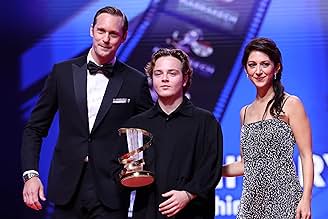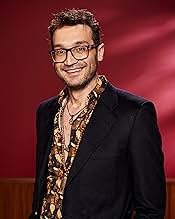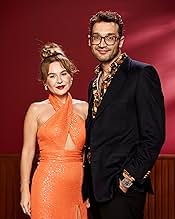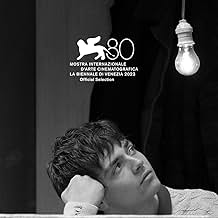PUNTUACIÓN EN IMDb
6,8/10
1,1 mil
TU PUNTUACIÓN
Ahmet, de catorce años, es enviado por su padre a un dormitorio religioso sólo para chicos, donde tiene que enfrentarse a las expectativas familiares, a sus obligaciones religiosas y a la in... Leer todoAhmet, de catorce años, es enviado por su padre a un dormitorio religioso sólo para chicos, donde tiene que enfrentarse a las expectativas familiares, a sus obligaciones religiosas y a la infancia a la que se aferra desesperadamente.Ahmet, de catorce años, es enviado por su padre a un dormitorio religioso sólo para chicos, donde tiene que enfrentarse a las expectativas familiares, a sus obligaciones religiosas y a la infancia a la que se aferra desesperadamente.
- Premios
- 15 premios y 26 nominaciones en total
Esila Ergun
- Little Girl
- (as Esila Ergün)
Reseñas destacadas
The story takes place in 1996 in Turkey, but the film is also a reflection on Turkey today, a very divided country, although the power dynamics has changed a lot.
The film fits many categories: a family drama, a story of class and religious struggle, a love story, and maybe most importantly a coming of age story.
The director was probably influenced by many films, one of them may have been Truffaut's 400 blows.
The relationship between Ahmet and Hakan is complex, beautiful and tormented. Contemporary films from Turkey are not afraid of addressing queer feelings and homophobia (Not knowing, Burning Days, and Black Night -Karanlik Gece-), and Yurt is a powerful contribution to this praise of sexual freedom.
The actors give an impressive performance and the photography is stunning. A real treat!
The film fits many categories: a family drama, a story of class and religious struggle, a love story, and maybe most importantly a coming of age story.
The director was probably influenced by many films, one of them may have been Truffaut's 400 blows.
The relationship between Ahmet and Hakan is complex, beautiful and tormented. Contemporary films from Turkey are not afraid of addressing queer feelings and homophobia (Not knowing, Burning Days, and Black Night -Karanlik Gece-), and Yurt is a powerful contribution to this praise of sexual freedom.
The actors give an impressive performance and the photography is stunning. A real treat!
If you only knew how sorry I feel for our children who experienced this and similar things. Unfortunately, things like this can still happen. Children who are sent to such dormitories for a purpose without even consulting their children may face many psychological problems throughout their lives. They always filter the events they experience through a religious filter and forget who they are. They lose their own character because they constantly shape their perspectives according to the moral values imposed on them. As someone who has many friends around him, like our main character Ahmet, and who has talked to people who have experienced such things many times, I was amazed. The director touched on the sensitive points so correctly that I felt like I had experienced these things. An incredible expression, so emotional. In my opinion, every viewer can find something from themselves in this movie... Congrats all the actors, especially precious director Nehir Tuna.
I found this film to be exceptionally well-made. From the actors to the scenes, everything evoked a sense of nostalgia. The realism was top-notch. In my opinion, it beautifully portrayed the struggles of a child torn between Kemalism and Islam. It captured the essence of being caught in the middle, feeling trapped, with remarkable accuracy. These aspects were all very valuable. I was particularly struck by the line, "Who is greater, Allah or Atatürk?" I believe it was a significant statement.
Moreover, the film sheds light on the intense impact of religion and nationalism on children in Turkey, often unnoticed by society. This depiction of children feeling trapped between these powerful forces makes it a crucial piece of work. I hope it reaches a wide audience and that everyone has the chance to see it.
Moreover, the film sheds light on the intense impact of religion and nationalism on children in Turkey, often unnoticed by society. This depiction of children feeling trapped between these powerful forces makes it a crucial piece of work. I hope it reaches a wide audience and that everyone has the chance to see it.
Dormitory
The film radiates corners, longing and monochromatic volumes. It is a heart where the blooming childhood enters in the forest of demarcations. The picturesque of black and white creates an enigmatic frame of emotions. It fleshes the character into the nuances of humanity of the bygone era and question about it. Promising frames, detailed costumes, classic editing, layered actors. The child Ahmets vulnerability, innocence and understanding goes through the tones of revolution. The film showcases an individual revelation of Godhood, companionship, parental relationships and openings of love.
10Alper-72
Yurt is truly an impressive and thought-provoking piece. It masterfully narrates a child's struggle to find themselves within the constraints imposed by society. Nehir Tuna's direction, atmosphere, and storytelling are highly successful.
In particular, the scenes reflecting Ahmet's inner world deeply affected me. On one hand, he is caught between his father's and society's expectations, and on the other, he begins to question the rules after meeting a freer character like Hakan. This internal conflict is portrayed very realistically. The anxiety, helplessness, and curiosity in Ahmet's eyes were palpable in every scene.
The film's way of depicting the environment of the dormitory, the pressure, and how individuality is disregarded was quite striking. The dark and oppressive tones perfectly matched the story's atmosphere. In some scenes, I truly felt as if I were inside that environment.
Additionally, the film subtly weaves in elements of the political atmosphere of the era. Details like Sevinç's use of the word "Aczmendi" remind viewers of 1990s Turkey and its conservative structure. These elements are integrated into the narrative in a natural flow, without being overly blatant.
While watching this film, I couldn't help but put myself in Ahmet's shoes. His internal conflict, the obligation to conform, and the burgeoning desire for freedom all felt incredibly familiar to me.
Ahmet's growth in an environment trying to box him in-caught between the desire to belong and the need to be free-reminded me exactly of my own experiences. That silence, the waiting to be understood without saying anything, questioning whether he is doing the "right" thing with every move he makes...
I was reminded that courage is contagious, but it also comes with a cost. In the final scenes, Ahmet's eyes perhaps showed for the first time that he truly understood things. At that moment, Ahmet was no longer present; I was.
Hakan's fate and Ahmet's inner journey seem to be left for the audience's interpretation. For some, this might appear as an unresolved ending, yet I believe it makes the message the film aims to convey even stronger.
In conclusion, Yurt is not just a coming-of-age story, but a film that questions the impact of society on the individual. It is definitely one of those productions that should be watched.
In particular, the scenes reflecting Ahmet's inner world deeply affected me. On one hand, he is caught between his father's and society's expectations, and on the other, he begins to question the rules after meeting a freer character like Hakan. This internal conflict is portrayed very realistically. The anxiety, helplessness, and curiosity in Ahmet's eyes were palpable in every scene.
The film's way of depicting the environment of the dormitory, the pressure, and how individuality is disregarded was quite striking. The dark and oppressive tones perfectly matched the story's atmosphere. In some scenes, I truly felt as if I were inside that environment.
Additionally, the film subtly weaves in elements of the political atmosphere of the era. Details like Sevinç's use of the word "Aczmendi" remind viewers of 1990s Turkey and its conservative structure. These elements are integrated into the narrative in a natural flow, without being overly blatant.
While watching this film, I couldn't help but put myself in Ahmet's shoes. His internal conflict, the obligation to conform, and the burgeoning desire for freedom all felt incredibly familiar to me.
Ahmet's growth in an environment trying to box him in-caught between the desire to belong and the need to be free-reminded me exactly of my own experiences. That silence, the waiting to be understood without saying anything, questioning whether he is doing the "right" thing with every move he makes...
I was reminded that courage is contagious, but it also comes with a cost. In the final scenes, Ahmet's eyes perhaps showed for the first time that he truly understood things. At that moment, Ahmet was no longer present; I was.
Hakan's fate and Ahmet's inner journey seem to be left for the audience's interpretation. For some, this might appear as an unresolved ending, yet I believe it makes the message the film aims to convey even stronger.
In conclusion, Yurt is not just a coming-of-age story, but a film that questions the impact of society on the individual. It is definitely one of those productions that should be watched.
¿Sabías que...?
- CuriosidadesYURT is a Turkish-German-French co-production.
Selecciones populares
Inicia sesión para calificar y añadir a tu lista para recibir recomendaciones personalizadas
- How long is Dormitory?Con tecnología de Alexa
Detalles
- Fecha de lanzamiento
- Países de origen
- Sitio oficial
- Idioma
- Títulos en diferentes países
- 你看見青春的顏色嗎
- Localizaciones del rodaje
- Empresas productoras
- Ver más compañías en los créditos en IMDbPro
Taquilla
- Recaudación en todo el mundo
- 86.322 US$
- Duración
- 1h 56min(116 min)
- Color
Contribuir a esta página
Sugerir un cambio o añadir el contenido que falta





















